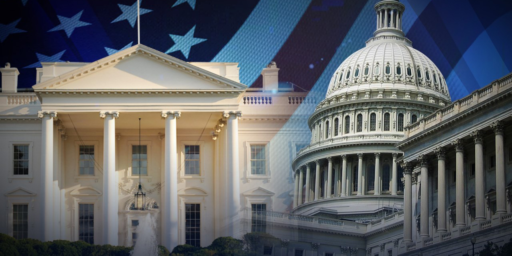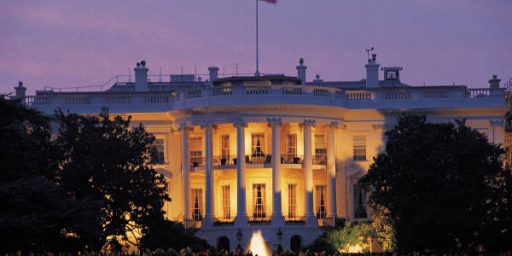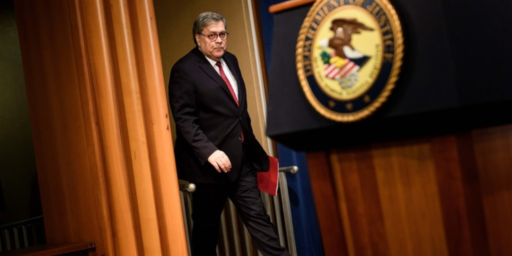Bush Won’t Enforce Contempt of Congress
The Bush Administration announced yesterday it will ignore demands from Congress to issue contempt indictments for officials the president has ordered not to testify. Dan Eggen and Amy Goldstein report on the front page of today’s WaPo:
Bush administration officials unveiled a bold new assertion of executive authority yesterday in the dispute over the firing of nine U.S. attorneys, saying that the Justice Department will never be allowed to pursue contempt charges initiated by Congress against White House officials once the president has invoked executive privilege.
On its face, that hardly seems bold at all. It’s rather axiomatic that the head of the executive branch would decline to have his subordinates file charges against people for doing what he has ordered them to do. It would be an absurd outcome, indeed, were an official to follow the president’s orders and then be arrested by that president’s men for doing so.
There’s a wee problem, however:
Under federal law, a statutory contempt citation by the House or Senate must be submitted to the U.S. attorney for the District of Columbia, “whose duty it shall be to bring the matter before the grand jury for its action.”
So, it would appear Congress has taken this matter out of the president’s discretion.
But administration officials argued yesterday that Congress has no power to force a U.S. attorney to pursue contempt charges in cases, such as the prosecutor firings, in which the president has declared that testimony or documents are protected from release by executive privilege. Officials pointed to a Justice Department legal opinion during the Reagan administration, which made the same argument in a case that was never resolved by the courts.
“A U.S. attorney would not be permitted to bring contempt charges or convene a grand jury in an executive privilege case,” said a senior official, who said his remarks reflect a consensus within the administration. “And a U.S. attorney wouldn’t be permitted to argue against the reasoned legal opinion that the Justice Department provided. No one should expect that to happen.”
Essentially, the administration is claiming that the law is unconstitutional and daring Congress to get a court order deciding the question. Apparently, it’s never been decided because, in the handful of cases where the matter has come up, a deal has been struck between the administration and Congress rendering the controversy moot.
Steve Benen is amazed by “how truly radical” this is. “Let’s cut to the chase: the president and his team are arguing that once the White House claims executive privilege, there is no recourse. The president is accountable to literally no one — not the Congress, whose subpoenas can be ignored, or the federal judiciary, which can’t hear a case that cannot be filed.”
But the president is merely refusing to issue criminal indictments. There are other ways to get a case to court. Orin Kerr guesses, “after the U.S. Attorney refuses to prosecute, Congress has to file a civil action seeking an order compelling the U.S. Attorney to refer the case to the grand jury. Courts then have to deal with that issue first, which could take a while as it works its way through the appellate process.”
Jacob Sullum, under the amusing post title “Bush to Congress: Try and Make Me,” wonders, “Under this theory, could the president also block the prosecution of an official who, say, tortured a prisoner or conducted illegal surveillance, if the president determined that such measures were necessary, proper, and constitutional tactics in the war on terrorism?” Well, yes. He could do that under any theory of executive power I’ve ever heard of.
Similarly, Steven Taylor entitles his post, “Bush to Congress: The DoJ Only Has to Prosecute the Laws that I Like.” But, ultimately, isn’t that always the case?
The executive branch, whether at the federal, state, or local level, always has discretion over how to execute the law. Local beat cops decide whom to arrest or issue a citation and whom to let off with a warning or ignore altogether. Mayors decide to suddenly enforce antiquated laws because they’re getting complaints from the voters about something or another. Heck, Rudy Giuliani made his reputation as a law and order guy by cracking down on squeegie men and others committing minor offenses. At the federal level, Democratic and Republican presidents use their discretion to order their Justice Department to increase or decrease emphases on enforcement of whole classes of criminal activity.
Still, as Radley Balko observes, the implications in the specific controversy are stark, “This administration is essentially saying that it and it alone determines when the people who work for it have broken the law, and no other branch of government has any say in the matter.” It’s not quite saying that, though, merely that it is a co-equal branch with Congress and that it won’t have its claims of executive privilege trumped by congressional fiat. Presumably, as Orin Kerr noted, Congress could force the issue through civil litigation.
There are, of course, other recourses. As Balko notes, there’s always impeachment. Less drastically, as Mark Kleiman points out, the Congress can use the power of the purse to make things difficult for the administration. Further, as Taylor suggests, this may increase pressure to distance the U.S. Attorneys from the political process, making them independent of the president. As I argued months ago, that would be a good thing for a variety of reasons.
Both sides are playing political hardball here. The administration is, I think, wrong on the merits here: It seems to me Congress has every right to conduct oversight into these issues and the executive privilege claims strike me as weak.
Ultimately, the Supreme Court should step in and decide this. Congress should file a civil injunction to compel the U.S. attorney for the District of Columbia to empanel a grand jury in these matters. If the president intervenes, there will be a case in controversy, which SCOTUS should fast track. The other branches will then abide by that ruling. If the Court rules against the president and he refuses to obey, Congress will almost surely impeach him.
UPDATE: Marty Lederman offers no opinions on the merits of the administration’s claims has some interesting background on what he terms a “contestable conclusion.”
UPDATE: Glen Greenwald has an extensive and generally persuasive essay on the “rule of law” implications at stake here. Ultimately, though, it comes down to a hypothetical:
The great unanswered question of the Bush administration has been, and continues to be, whether, upon losing a judicial battle, they would explicitly claim the right to defy the judicial order on the ground that the order exceeds proper judicial authority.
It seems reasonable that, if the executive and legislative branch have limits to their authority — and they do — that the “weakest branch” should also have such limits. Beyond impeachment, though, there’s not much remedy given in the Constitution for perceived overreach since, indeed, the very power of judicial review is extra-Constitutional. Andrew Jackson once famously challenged the Court to enforce its orders and FDR threatened to expand the size of the Court and pack it with sympathetic Justices, so the question is hardly new.
Regardless, though, for the president to refuse to carry out an order from the Supreme Court, especially one in a case brought by Congress against him, would create a Constitutional crisis. The remedy, though, would be simple: Impeachment. That, ultimately, is the constraint on an overreaching executive. Short of that, the branches are merely exercising their invitation to struggle, a practice which goes back to the days of George Washington’s administration.






Apologists for the Bush administration’s power grabs are going to look mighty foolish when they start complaining about President Hillary’s abuses of power.
Why should Congress wait for the judiciary? A president’s refusal to allow executive officials engage in mandatory ministerial affairs is an impeachable offense, plain and simple. Now that the cards are on the table, so to speak, why play the Kabuki game at all?
Oh wait – that damn obstructionist minority in Congress that’s been plaguing us for 7 years…
Of course, Congress can’t really pursue this through the Court. If the President loses, then their would be no way a Democratic president could refuse similar inquiries in the future. Don’t think the Dems aren’t thinking “Wish we’d thought of that when Clinton was President”. And really at this point, by the time it was resolved, the Bush administration would be pretty much over so it would really only adversely impact future administrations. I predict that we will see a Democratic vice president refuse to reveal the details of their task force on something or another.
Not to mention, going through the courts would pretty much end “The dictator is coming, the dictator is coming” alarm. True if the Court ruled against the administration and they still refused, the alarm would rise again but as we saw the Clinton, it isn’t over until you get a real good handle on what “is” is. Which would probably take more than 15 months, which is the real deadline in all this.
James, I don’t think the Constitution permits the establishment of a 4th branch of government. Since enforcement of law is in the bailiwick of the executive branch. Executive privilege was established to protect the operation of one branch from unnecessary intrusion by a politically motivated congress. An example would be the ratio of legislation accomplished by this congress compared to the number of investigative committees currently in session. I thought the President had the right to fire those who work for him. I guess that is true unless it is a Republican President and a democratic congress has an axe to grind. The President should send the justice department orders to arrest the Democratic leadership charging them with treason.
Well, yes and no. (Indeed, I expected someone to raise the issue). Certainly the President sets the agenda, through his appointments primarily, as to how the the DoJ will allocate resources and which areas of policies will be emphasized. However this is different than expressly ordering the DoJ to not enforce a specific law.
By that logic the President could simply tell the DoJ to stop enforcing immigration law or drug law or anything else the Congress passes. Somehow I think that that would violate his Constitutional charge to “take Care that the Laws be faithfully executed” as per Article II.
There is an important difference between emphasis in policy and selectively deciding which laws he will actively order be ignored.
(And I do recognize that we ultimately agree on the specific problems here).
Likely true in principle. Haven’t presidents essentially done that, though? Surely, for example, the Clinton and Bush administrations had vastly different agendas on civil rights laws, going after violent union activities, violations of the Hyde Amendment, and so on and so forth.
A President Ron Paul would, presumably, all but stop enforcing drug laws. Certainly, he wouldn’t go after prosecutions of medical marijuana cases.
James,
You took a long time to make your “axiomatic” point. Yes, the prez can do what he wants, and congress can choose to fight it or not. But a hard fight could severely damage one branch or the other. Of course, liberals only care about the here and now-and the country be damned. So maybe we will see a showdown.
There is a difference (and, I would argue, a very serious one) between emphasizing marijuana prosecution over civil rights cases versus specifically directing the AG not to enforce laws against marijuana usage. Bush, for example, is not especially interested in see civil rights cases prosecuted, but I can’t imagine (although I could be wrong) that there have been no civil rights prosecutions (and the cancellation of existing cases) because Bush was elected.
The case here is a specific order for the AG to ignore a specific law. It is made even worse, in my opinion, because it is self-serving and challenges what I would argue are clear constitutional authorities belonging to the Congress and responsibilities belonging to the President.
If that is acceptable, I am unsure how that would prevent the President for ordering the AG to not prosecute the next Duke Cunningham or whomever for whatever reason.
As you know, James, I’m fairly cynical about impeachment proceedings—basically, I think that grounds for impeachment are anything the House of Representatives think they are. It seems to me that the President may be handing to the Congress the best grounds yet for impeachment.
I do think that there are legitimate reasons for presidents in the abstract to refuse to enforce contempt of Congress citations, for example when the demands of Congress that he’s ordered ignored are purely political or fishing expeditions. Or if the demand of Congress is clearly unconstitutional. Are any of these true in this case? I’m not informed enough on the background to present an informed opinion.
With these and, probably, a few other exceptions, I think the President is obligated to enforce even distasteful and objectionable contempt of Congress citations. The alternative would seem to be for Congress to have its own independent police power and that would really have constitutional problems.
What he has done to gut the civil rights division of DoJ is much more clever:
He started hiring inexperienced hacks for civil service jobs with no civil rights ligitgation background.
He had the division sue six states saying they had “too many voters” on the rolls–as part of the non-existent “voter fraud” scare concocted by Republican political operatives.
Fired any US Attorney’s that chose to actually pursue legitimate case and fire those who didn’t purse illegitimate cases.
First of all, liberals like Steven Taylor and Triumph are perpetuating the myth that republicans don’t favor civil rights, which is obviously untrue. I don’t have to tell you guys that, since u already know it and feel the need to perpetuate the myth (lie) in order to meet your liberal agendas. The fact that Bush doesn’t see the need to make up civil rights actions like liberals do is in fact refreshing and not racist like the implications try to appear.
Secondly, the DoJ firings have nothing at all to do with congress. It was all in the power of Bush to do what the heck he wants. End of story. That OTB would indicate otherwise in a continuing reminder of its’ increasing irrelevance and liberal agenda.
Sad.
Personally I think Bush is doing this because he expects to win whatever case is brought before the Supreme Court.
The risk isn’t Bush defying a judicial order. The risk is the court granting him the power. I think it’s pretty much what it looks like – an attempt to shift power from Congress to the White House through an expanded application of Executive Privilege.
As such it’s not really a partisan issue, though circumstances immerse it in a partisan dispute, which serves as nice cover for the actual content.
But it really shouldn’t be seen that way. It goes to how power is shared between the two branches without regard to who controls either. Fundamental governmental structure. If the Justice Department really doesn’t have to cooperate with Congress on any executive privilege issue, then the options available to Congress are substantially reduced, and its power correspondingly reduced
This is a non-story. The headlines should have been, “Bush Administration, like all others, declines to prosecute itself for contempt of Congress.”
From this morning’s WaPo:
This is all PR. The Democratic leaders in Congress know, and have always known, that using the criminal contempt of Congress statute was a non-starter. This whole exercise was undertaken solely to get a big headline saying, “Bush claims to be above the law!” in the full confidence that no one much would notice the contrary story (on page A03, of course) the next day.
Interesting, indeed, that we were only told about the Reagan precedent and not a similar one under Clinton.
Oh, good lord. Do we really need to break out the whole liberal media thing here? The Washington Post’s article is AGREEING with you. Does it really matter which administration they use as an example (not to mention that the quote references precedents from both administrations)?
So, in keeping with the spirit of these comments, let me just say that all conservatives are too lazy to read what they’re commenting on, and hide their ignorance by shifting attention to the specter of a demonic liberal media (despite constant empirical evidence to the contrary). Of course, we all know that’s not true, but it’s no less correct than saying all liberals make up civil rights issues or don’t care about the country.
“It was all in the power of Bush to do what the heck he wants.”
But this is a joke, right?
Going to court is not really necessary. One can google it, but the “Contempt of Congress” right was upheld by the Supreme Court a long time ago. In fact, Congress can order its own “officers” to arrest anyone held in contempt of congress and try them within the chamber itself. If the US Attorney wants to not pursue it, fine, congress can do it itself, per the constitution. The only reason the law was created, was to make it an actual criminal offense. (Being tried by congress doesn’t constitute a crime, but does impose jail time and fines.)